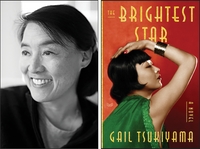In her ambitious sixth novel (Dreaming Water
; The Samurai's Garden
), Tsukiyama tackles life in Japan before, during and after WWII. The story follows brothers Hiroshi and Kenji Matsumoto through the devastation of war and the hardships of postwar reconstruction. Orphaned when their parents were killed in a boating accident, the boys are raised by their grandparents in Tokyo. In 1939, Hiroshi is 11 and dreams of becoming a sumo champion, and soon Kenji will discover his own passion, to become a master maker of Noh masks. Their grandparents, Yoshio and Fumiko Wada, are vividly rendered; the war years and early postwar years, centered in their home on the street of the novel's title, are powerfully portrayed. Hiroshi and Kenji reach pinnacles of success in their chosen fields as well as in love, and while Tsukiyama's close attention to historical and geographical detail enriches the narrative, she isn't as successful when describing Hiroshi's wrestling career; the matches all begin to blur together. The lingering effects of war, on the other hand, are clear, and these, combined with a nation's search for pride and hope after surrender comprise the novel's oversized heart. (Sept.)


